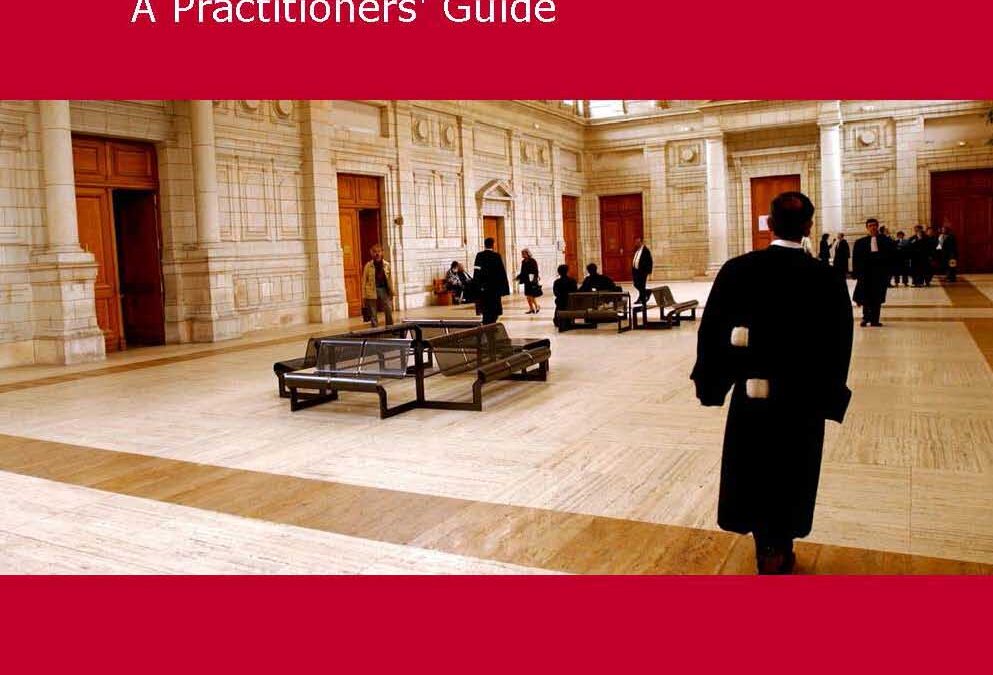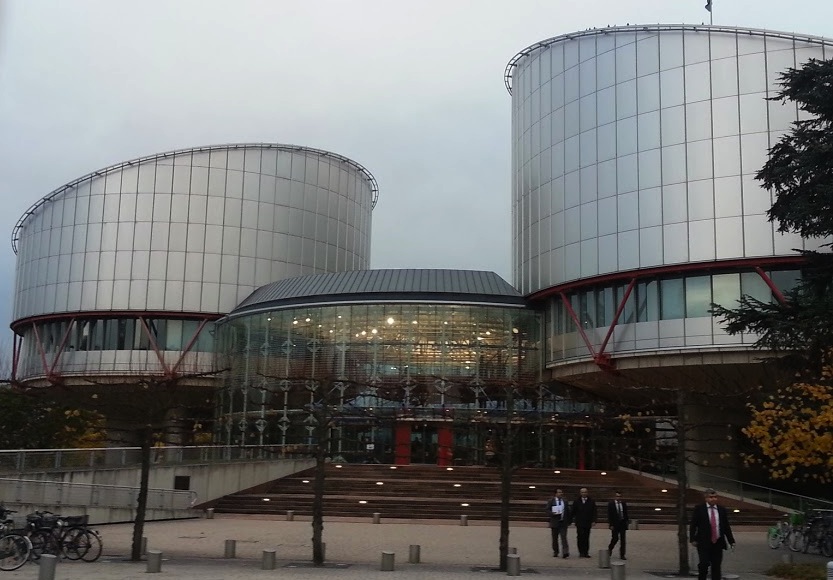
Feb 23, 2016
In January 2016, ICJ provided an expert legal opinion to the applicant’s legal counsel in the case of “X” before the Swedish Migration Agency with a view to assisting them in assessing “X”’s asylum claim.
The case in the context of which this expert legal opinion was submitted concerns a sur place application for refugee status under the Refugee Convention based on a well-founded fear of persecution for reasons of the applicant’s membership of a particular social group, namely one defined by his sexual orientation.
Sweden-Expert legal opinion sur place asylum claims-Advocacy-Legal submissions-2016-ENG

Feb 19, 2016
Today, the ICJ publishes Refugee Status Claims Based on Sexual Orientation and Gender Identity – A Practitioners’ Guide.
The organization has decided to publish this guide for two main reasons.
First, persecution of individuals motivated in whole or in part by ignorance of, prejudice and hatred against their real or imputed sexual orientation and/or gender identity (SOGI) is rife in all regions of the world, with serious and widespread human rights abuses being perpetrated too often with complete impunity.
Therefore, claims to refugee status under the Refugee Convention for reasons of real or imputed SOGI are unfortunately likely to increase in all regions, given that around the world, lesbian, gay, bisexual, transgender and intersex individuals continue to be targeted for egregious human rights abuses, paradoxically, in part, because they have become more visible by asserting their existence, rights and agency outside the relative safety of “the closet”.
Secondly, while persecution for reasons of real or imputed SOGI is not a new phenomenon, in many asylum countries there is a greater awareness that people fleeing persecution for those reasons are entitled to be recognized as refugees under the Refugee Convention.
Nonetheless, this is an area of the law of refugee status where the application of the refugee definition remains inconsistent, as it is complex and fraught with both substantive and procedural challenges.
The ICJ’s latest practitioners’ guide describes both in general and specific terms each element of the refugee definition under the Refugee Convention that is critical to understanding and doing justice to claims based on SOGI.
After discussing how to establish refugee claimants’ credibility with respect to SOGI, the structure of the practitioners’ guide follows the relevant elements of the refugee definition in Article 1A(2) of the Refugee Convention, namely: well-founded fear; persecution; for reasons of; membership of a particular social group; and failure of State protection.
The guide also addresses the concepts of internal flight/relocation alternative and sur place refugee claims, which, while not expressly mentioned in the Refugee Convention, are increasingly critical to refugee claims for reasons of SOGI.
The practitioners’ guide is intended to provide both legal and practical interpretative guidance on those types of refugee claims to:
- legal practitioners representing individuals;
- others who assist refugee claimants, whether in a professional or voluntary capacity, including members of non-governmental organizations;
- decision-makers within refugee status determination authorities and members of the judiciary presiding over claims to refugee status;
- officials within government departments issuing asylum policy guidance and instructions;
- UNHCR officials both within the Division of International Protection and those who carry out refugee status determination under the agency’s Statute; and
- refugee claimants themselves.
The ICJ’s aspiration and ultimate aim in producing this practitioners’ guide is to provide enduring legal and practical advice on the interpretation of the refugee definition under the Refugee Convention in respect of claims to refugee status based on SOGI notwithstanding the fact that this is an area where the law of refugee status is particularly fast-moving and is constantly evolving.
Finally, the ICJ hopes that this practitioners’ guide will assist in ensuring that people entitled to international protection for reasons of real or imputed SOGI be recognized as refugees under the Convention.
universal-pg-11-asylum-claims-sogi-publications-practitioners-guide-series-2016-eng (full book in PDF)

Feb 16, 2016
In mid-February 2016, the ICJ made a submission to the Committee on Economic, Social and Cultural Rights in advance of Committee’s examination of Namibia’s combined Initial, First and Second Periodic Reports under the International Covenant on Economic, Social and Cultural Rights.
In its submission, the organization drew the Committee’s attention to the detrimental impact of the extant criminalization of consensual anal intercourse between males and of other various forms of sexual activities between consenting men through the crime of “unnatural sexual offences” on the enjoyment of Covenant rights, including, in particular, the principle of non-discrimination and the right to the highest attainable standard of physical and mental health by gay and bisexual men and, more generally, by the gay, bisexual, lesbian and transgender community in the country.
The ICJ’s submission contains a number of recommendations that the organization considers the Committee should address to the Namibian’s authorities to address its concerns.
(Full text in PDF)

Jan 15, 2016
Today, the ICJ submitted a third-party intervention in the case of M.B. v. Spain before the European Court of Human Rights.
The case arose from the attempted removal of a lesbian asylum applicant to Cameroon. The ICJ’s written submissions focus on the relevance of the Refugee Convention, as interpreted by a number of domestic courts, and the EU asylum acquis and the EU Charter of Fundamental Rights, to the determination of the scope and content of non-refoulement obligations under Article 3 of the European Convention on Human Rights (ECHR) of those Contracting Parties that are also EU Member States.
The ICJ’s intervention, in particular, addresses the following:
- the requirement of coerced (including self-enforced) concealment of one’s same-sex sexual orientation, which constitutes persecution under refugee law and is incompatible with the ECHR, in particular Article 3; and,
- the criminalization of consensual same-sex sexual conduct, which gives rise to a real risk of Article 3 prohibited treatment, thus triggering non-refoulement obligations under that provision of the ECHR.
Spain- ECtHR MB v Spain – advocacy – legal-submissions-2016-ENG

Oct 21, 2015
Today, the ICJ jointly with the AIRE Centre, ECRE and ILGA-Europe submitted a third-party intervention in the case of O.M. v. Hungary before the European Court of Human Rights.
The case arose from the immigration detention in Hungary of an asylum-seeker who had fled from his country of origin, Iran, because of his homosexuality. He was detained for nearly two months before eventually being recognized as a refugee.
In their written submissions to the European Court of Human Rights, the interveners focussed on:
- the relevance of the EU asylum acquis, the EU Charter of Fundamental Rights and the 1951 UN Convention relating to the Status of Refugees, as amended by its 1967 Protocol, to the determination of the scope and content of Contracting Parties’ obligations under Art 5(1) of the European Convention on Human Rights; and
- the Contracting Parties’ obligation under the European Convention on Human Rights to take account of the particular risks that the detention of asylum-seekers entails, including, in particular, when deciding to detain those asylum-seekers who might have been exposed to abuse and/or may risk violence and discrimination on account of their sexual orientation while in detention.
Hungary- ECtHR OM v Hungary – advocacy – legal-submissions-2015-ENG









